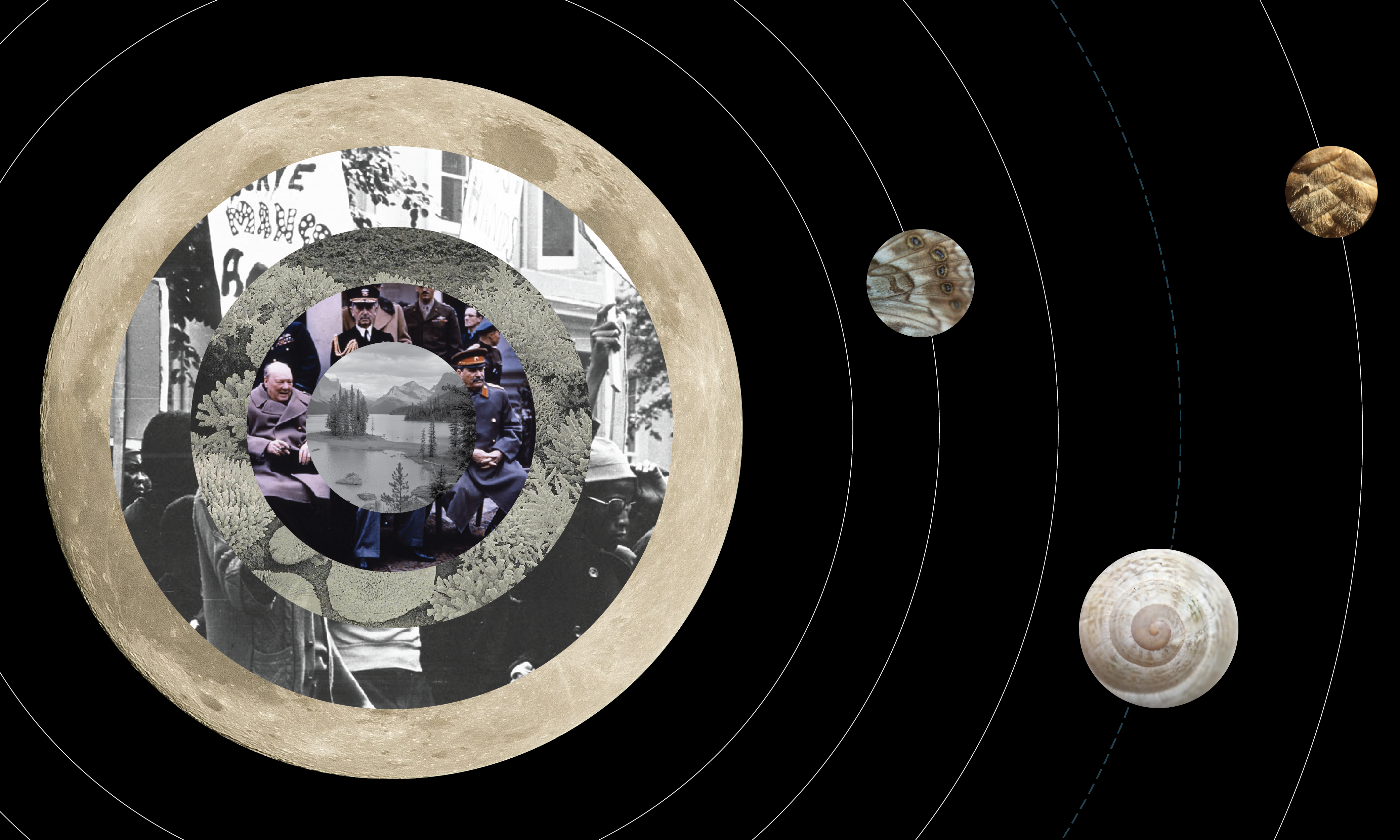“2170”

By Amanda Ellard
I spent years in my office deliberating the evolution of society before I wrote my first full sentence. It wasn’t until this one forsaken party had ended in the basement crawlways of the professor offices that I discovered the concept of a sentence for the first time. I swore off alcohol the next morning because I was so upset that I couldn’t remember the line clearly. It was something about the triviality of apricots. I studied Old English for a while when I realized the sentence I saw was most likely unimportant, idle scribble to the original writer. However, with all aspects of Old English, importance is in the eye of the beholder. Things gain new life once placed inside their rightful context.
That night, I was one of the last students left with the professors, mostly because their liquor was strong and I wasn’t confident enough to walk away. We ended up in the communication science office. The walls were covered with different renditions of the Doppler effect. Some renditions were designed to look like blueprints while others looked like drill points about to spin. One could be a cross section of the circles. I wanted to think this way of visualizing the effect was valid, as well—wavy lines appearing to fly flattened closer to the middle or, perhaps, they just flew into the distance chasing after one another. As a man of science, I couldn’t be seen staring at these cheesy prints for long, so I began poking around the bookshelf. Behind the first rows of books rest another next to another. One lucky hand brought my fingers to the soft feather of old paper and leather. I found it there, a full sentence written out with some letters I’d never seen before, which I now know to be vowels, and sounds stacked in neat lines that created the full pronunciation of the words we speak aloud. Thinking on the fond memory now, I’m shocked I wasn’t panicked about getting caught finding this secret. Fortunately, the professor likely had no idea the sentence was there. They were all distracted with the liquor flowing between their hands.
Although I couldn’t read the Old English then, somehow my mind knew this line of full, ample words bursting with double the sound was beautiful. Sometimes you can walk away from the art piece you think you need because you recognize it as still a rough diamond. It is not completely perfect for you, so you can talk yourself away from conquering it. But that logic didn’t apply with the full sentence—I had to have it for myself. My immediate need was to urinate and then sleep off the drinks, but the sentence’s glimmer shone through my mind the next morning. I broke into that office two years later to find my original muse, but the room was emptied out. The professor had apparently been murdered.
I believe I’m a man of science, however that is the only thing one can be in today’s society. I’ve since created my own version of man, the Old English Man, but before my encounter with the full sentence, I was ignorant alongside the rest of the world to the possibility of writing outside of necessity. Old English was mentioned briefly in my school education as the segue between Ancient English and our English today. I reveled how there used to be a time where people used ye and thou art in the long, long past. Then that Ancient English evolved to Old English. While we still speak the same way today as in Old English, society since evolved to be against wasting time. Writing from Old English transcribed words as they sounded, but our normal way of writing today cuts out all that unnecessary time. After all, if you know the meaning is the same, why take the time to write out the sounds of those words? A few letters that resemble the sounds or a symbol of the noun all suffice. It took a year of research to learn that people in Old World used some of our writing back then too. However, it was inconsistent. There was a difference between formality and colloquialism, between media used (like paper and digital), and it was all completely by choice. It seemed as if people back then could make the conscious choice to write like us or write out full sentences and words. Why couldn’t we also make this choice for ourselves? It took me another two years of research and sifting through the eighty-five plausible conspiracies (all of which I personally developed) to come across the dreadful answer: no one cared, and no one needed it.
The night after that professors’ party, I spent twenty hours trying to find information on the full sentence, but the internet and library databases were a no-go. I did discover an outdated attempt at the internet was wiped a little less than a hundred years ago. Anything of extreme importance, such as historical documents, had been kept for transcribing and condensing. By now, all the transcriptions were long finished, meaning all was essentially lost. Except, I refused to believe it was all gone since I recalled this one profession of digging. It was an old science of digging things up to find the artifacts of lost civilizations and the bones of ancient reptiles. I essentially knew one could uncover lost objects after enough delicate digging.
I rushed to finish school. My thesis to graduate the university was almost complete; I finished it in one sleepless, fell swoop without attending the graduation ceremony. Now that I didn’t have to leave my house for anything again, I poured all my attention into research.
As I attempted to write my first sentence, it was obvious that I needed a strong grasp on the purpose of that sentence. After all, if you do a great act but you do not know why, how can you accomplish it to an acceptable standard? You can force it out for the sake of fulfilling an expectation or while you are under threat. However, it will only amount to a shell of its full potential. I’d rather pass a rough diamond through my fingers than a well-polished stone, even if my fingers will bleed. Therefore, I did not allow my itching hand to paint my first sentence into the world. I kept it safe inside the folds of my brain until I could exclaim the purpose of the sentence with my own certainty.
And so I spent years in my office deliberating the evolution of our society before I wrote my first full sentence. I had to start by backtracking layers of translation. Did you know un-translating is harder than translating? In the process, I discovered our current habits originate in various places. I soon had a web to follow back through time. For example, short names came from Thai. One day someone must have asked, why have a legal name and a nickname if everyone just knows the nickname? And now everyone is required to have a full name under three syllables to save ourselves the most time while ensuring there were enough syllable combination for the population. I also discovered our requirement of denoting respect levels when referring to others came from Japanese. With just one syllable tacked on the end of someone’s name, we now know their hierarchy level in society. It’s perfect for knowing if someone is rich or poor, if you need to be on your best behavior towards them, or if they should be catering to you. Using this practice saved our society so much time. However back then, if you became close friends with a person, you no longer used that specific denotation, even when introducing them to a stranger. What a terrible friend to not help them out. Moments like these in my research made me feel like the web reached a dead end. My nerve cell tendrils shut off and I was left circling in panic, lost, until I found a new synapse to jump through.
The most stressful moments actually had nothing to do with the full sentence itself. You see, number eighty-one in my eighty-five plausible conspiracy theories involved government intervention. They will knock on my door one day once I finally have my pen in hand and demand repentance and I will not leave my study because the full sentence is still coming through the birth track so I must stall my arrest. From the front door to the living room, I built a field of trip wires to set fire to the couch to keep them from coming towards the study. Then I mail-ordered a vault door, the kind that’s bullet-proof and rebounds sound right back at you, and installed it in front of my study door. This way they cannot have a shoot-out and I won’t have to hear them yelling as it will all bounce back to their own ears. Oh, the tricks I can play! Oh, the days I lost not writing the full sentence by protecting its origins.
I threw a birthday party when I wrote it. Even if the sentence is an alien from another time, it still deserves a traditional birthday party.
Did you know there was a time when names were shortened for fun? Abigail was shortened to Abby and apparently it was universal knowledge that Abby meant Abigail. How did everyone have time to memorize all these things? Old World people lived quite leisurely. I needed to make sure this child of mine would not evolve to be so idle. Did you know there was a time when people had denotations? Not those hierarchy ones I mentioned before, but ones that corresponded with bodies. They matched the body you had or labeled you as someone who didn’t like the body you had. What a terrible time to be alive, having to remember people’s denotations like that. Yes, I have a growth between my legs, but you could have a growth between your ears, thrust it into a hole, and also make something of it, for all I know.
When I wrote my first paragraph, I realized it was ludicrous. When I burned it and wrote it again, I realized I had nothing to say. When I ate that second paper, I thought perhaps the beautiful sentence would grow like a vine up my esophagus into my brain. However, the third paragraph I wrote was so unappealing that after I shitted out the second, I flushed the third down with it, too.
Author Biography
Amanda is a Floridian working on her master’s degree in prose at Stetson University. She enjoys translation and examining East Asian folklore. She is always searching for unexpected ways to weave together or intersect writing genres.
Visual Artist Biography
Paige Welsh is Anastamos’s creative director. She is pursuing an MFA in fiction. Her thesis at UC Santa Cruz won the Chancellor’s Award. You can follow her on Instagram and Twitter.


No Comments